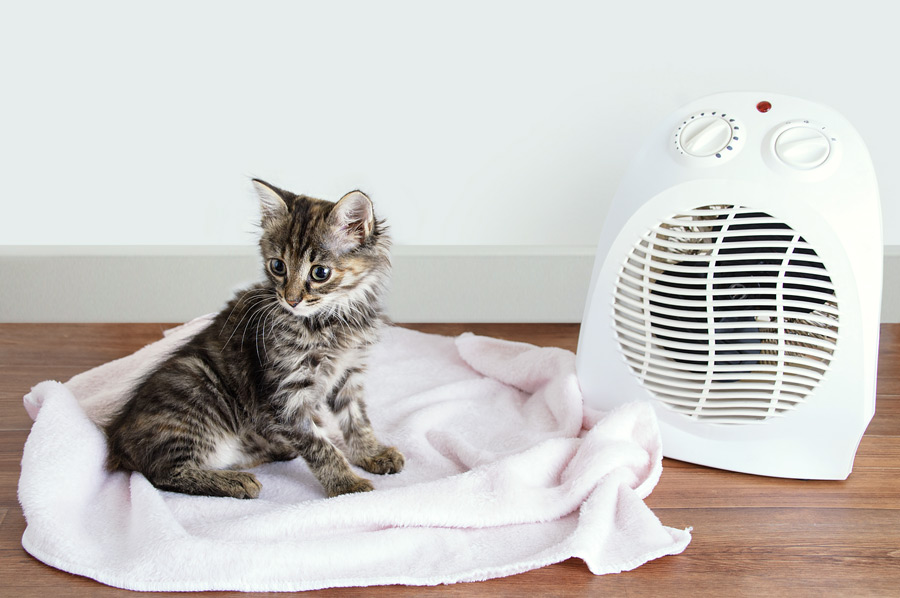
You just moved into a new apartment, and the heating is not ideal. Texas can get surprisingly cold in the winter and become quite chilly, especially at night. You want to stay warm and cozy without running up heating costs, so you start researching how to use a space heater safely in your apartment.
Many people can face challenges when using a space heater in their apartment. Not only can it be dangerous when not operated properly, but it can also result in electrical issues and, even worse—damage to the property or injury to themselves.
Using space heaters can be deceptively tricky, but we are here to help you stay safe, warm, and toasty during the frigid months.
Understanding the Safety Risks Associated with Space Heaters
Space heaters can effectively keep your home warm in the winter, but they also come with potential safety risks if not used correctly. It is essential to understand these safety risks before using a space heater in your apartment.
Fire Risk from Overheating or Poor Positioning
Space heaters can quickly overheat, which can lead to fire risk. High-wattage space heaters are at risk of overheating and should be used cautiously. Keeping the space heater at least 3 feet from other objects and out of high-traffic areas will reduce the risk of things accidentally catching fire.
Carbon Monoxide Poisoning:
Portable space heaters that use a fuel source such as propane or kerosene can release toxic fumes and gases, such as carbon monoxide. To avoid the risk of carbon monoxide poisoning, use only electric space heaters and never place a fuel-burning space heater in an enclosed space (such as an apartment). Most properties have guidelines that restrict the use of open-flame appliances due to their high risks. The restrictions are meant to protect other tenants and the property. Be sure to check with your property manager if you are unsure.
Electric Shock Risk
Space heaters not plugged into a GFCI (Ground Fault Circuit Interrupter) outlet can cause electric shock if the plug is damaged. Only use space heaters with a GFCI-protected outlet to reduce the risk of electric shock.
Electric space heaters require a substantial about of electricity to produce heat to make your area comfortable. Power to an apartment can be limited depending on the apartment's size and age, and the property may have wired the units within the living structure. Most units run on 1500 watts of electricity; however, some environmentally friendly models can use as little as 400 -500 watts. Why is this important to know?
Choose a Space Heater That is Suitable for Your Apartment
When selecting a space heater, choose one that is suitable for the size of your apartment and the wattage requirements in your area. It should be large enough to heat the room or area you want to warm up while still being small enough to fit in the available space. Low-wattage space heaters are often much safer than high-wattage models, as they are less likely to overheat.
Space heaters can pull a heavy load of electricity if you have other appliances, such as a washer/dryer, furnace, or other devices running simultaneously; the risk of tripping a circuit increases significantly. If you live in an older property, that risk may go up. This may be bad news for your and your neighbors.
Power Management Plan
Proper current management is essential for ensuring that a circuit does not become overloaded. If the breaker keeps tripping, it could be due to the power needed to run certain appliances. High-load appliances, such as air conditioning units, electric dryers, and stoves, draw significantly more energy than lower-load appliances like televisions and coffee makers. To avoid overloading the circuit, manage high-load devices and stagger their usage so that not all run simultaneously. Opt for low-power options on high-load appliances when shopping for new ones, or look for newer models with lower power consumption ratings. With some planning and knowledge, circuits can run smoothly and safely.
Follow the Manufacturer's Instructions Carefully and Inspect Regularly for Damage or Wear & Tear
Space heaters can be dangerous if not used correctly and safely. When using a space heater, it is essential to follow the manufacturer's instructions carefully and inspect the space heater regularly for damage or wear & tear. A simple Google search can help to find the operator's manual for your unit if needed.
If your unit makes strange sounds or smells funny, turn the heater off and unplug it from its power source. Check the power cord for damage, such as tears on the cord insulation and punctures from pets using it as a chew toy. Hot spots on the cable can also develop when the wiring is damaged from too much bending or repeated wear and tear.
Keeping your heater in a safe, level area away from pets and kids will help to prolong the life of your space heater and its various parts to keep your family warm and your property safe.
Conclusion
In conclusion, using a space heater in an apartment can be dangerous if done incorrectly. It is essential to choose the right size and wattage for your living space, ensure proper ventilation when running the unit, place it on a level surface away from flammable objects, and connect it to a GFCI outlet or protected power source. Additionally, you should follow all manufacturer instructions carefully and regularly inspect for damage or wear & tear. Following these safety tips and implementing proper current management techniques like staggering high-load appliance usage times will help keep your family warm while ensuring that your property stays safe.